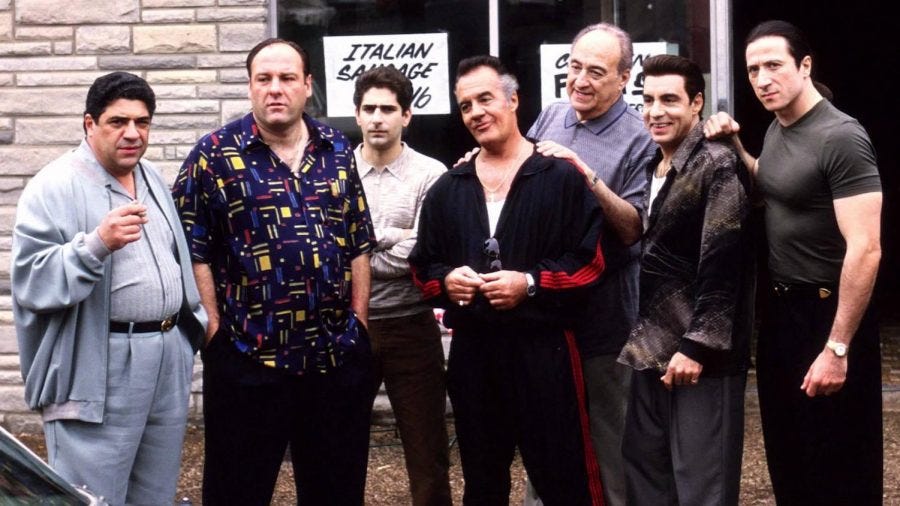Why Do I Keep Watching the Sopranos?
A few days ago, I finished my third rewatch of The Sopranos since Covid began, meaning I have watched all 86 episodes (about 80ish hours) three times in two years. This brings my total watches of the series up to at least 10, which is well over a month of straight watching and it may in fact be far more than that. Even now I’m itching to start it again. I’ve now entered the mouth of madness and no longer watch the show chronologically, instead skipping around seasons as it strikes me. To call it my favorite TV series is an understatement, by the number of hours watched, it is easily my favorite piece of media of all time. The show has never been more popular, but still is it really that good? I have yet to convert several friends who spend what little free time they have watching Ozu or Bergman movies. “It just seems like shitty New Jersey people and culture.” And that it is! But it also is as good, and in fact even better than its very esteemed reputation. Not only is The Sopranos the greatest summation of late 20th century American ennui, the richest Mob epic, the funniest show of all time, but also a deeply haunting meditation on existence. What follows are the aspects of The Sopranos that elevate it to its godhead status.
The Acting
This is obvious, but still needs to be emphasized. The acting in The Sopranos acting is so good, the characters so holographically evoked by the actors that many of them live under a permanent eclipse: they are who they were on the show for the rest of their lives. Michael Imperioli who played the poetically idiotic and oft addicted Christopher Moltisanti is in real life a refined and even slightly pretentious multi-artist who like Ethan Hawke who has to try their hand at everything. He has a shoegaze band named Zopa, he and his wife owned a black box theater in New York. He is a Buddhist. His favorite director is John Cassavetes. And so on. But to the rest of us, he will always be Christopher, who said things like “As for my modeling career, I’m sure I’d be a huge success” and writes things like “I must be loyle to my capo!!” Because of this, Imperioli has a bit of an edge. When Steve Schirripa (who plays Bobby Baccalieri) remarked on a podcast that almost every fan interaction he has is positive, Imperioli snapped back: “That has not been the case for me.”
Many of the most indelible characters were played by people who never really acted and were perhaps never really actors to begin with. They met their character and fused like Jeff Goldblum in The Fly. Robert Iler who played Tony’s failson AJ, basically became AJ after the show wrapped, dabbling in professional poker before going to rehab for booze and cocaine. Federico Castelluccio who played the gaudily dressed but sadly romantic Furio is a classically trained oil painter who found an authentic 17th century Guercino painting massively undervalued at an antiques market, which is a plausible narrative of what happened to Furio once he fled to Italy.
James Gandolfini was of course a great actor, and he was able to escape his character a bit more than others—giving light, appealing performances in Enough Said and In the Loop before his untimely death. His performance as Tony Soprano along with Robert De Niro as Jake Lamotta in Raging Bull are, to my mind, the greatest feats of acting I’ve ever seen. Through commitment, artistry, and sheer physical will, a coarse and brutal character is elevated beyond reality to a pure and electric symbol that transmits with the clarity of a parable. Tony and Jake are the apotheosis of base male existence: some ever throbbing sequence of rage, gluttony, and horniness. But Gandolfini and De Niro are so brilliant they universalize it further. Tony and Jake became piquant and monstrous puppets of human existence. To be an animal that yearns and acts on impulses but then wonders why he still wants more and yet feels empty, and wonders and wonders….
Keep reading with a 7-day free trial
Subscribe to Neil Before The Barbarians to keep reading this post and get 7 days of free access to the full post archives.


